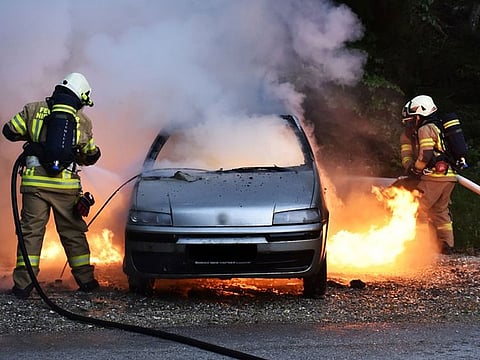UAE: 7 leading causes of car fires
We asked UAE-based automobile experts on the top reasons for car fires

Also In This Package
1. Fuel Leak
Apparently fuel leaks are the top causes of car fires. If there is a fuel leak, any spark generated around the leak can result in a blaze. If the fuel leaks and vapourises into the air under the hood, the fuel/oxygen mix is ideal for ignition. All it needs is an errant spark or for the temperature to rise around a hot exhaust manifold and gasoline will auto-ignite without the need for a spark.
The spark does not even have to be internal, a spark from a burning cigarette is enough to cause a fire.
If you smell fuel in your car while driving, park immediately at a safe spot and move to a safe distance from the vehicle before calling for help.
2. Electrical fires
Electrical faults and improper wiring are a major cause leading to car fires. Battery and starter cables carry enough current to ignite combustibles in case they are faulty. Even broken light bulbs can be a source of ignition.
Cables can fray over time and can result in a short circuit.
While protection devices such as fuses, fusible links and circuit breakers are installed for safety in case of arcs or overloaded wiring, sometimes components wear off over time. They need to be checked and maintained regularly.
Unauthorised electrical modifications done at unlicensed workshops, shoddy repairs or poor installation of aftermarket parts can defeat these safeguards.
Electrical faults in high-current devices such as power seat or window motors can result in ignition of insulation, carpets or even discarded paper accumulated under seats. So, do not use unlicensed workshops to save money, you might end up paying a high price because of a car fire.
3. Oil leak
It's easy to ignore that spot of oil under your car, on the floor of your car park. But, is it safe? What may look like a minor leak may soon turn serious. If it falls on the hot exhaust manifold of the car, this can lead to a fire while the car is running. It could be the engine oil, gear oil, brake oil or steering oil. If you see oil spots under your car, avoid driving the car without fixing the issue urgently.
An oil leak that is left alone can also cause seals or rubber hoses to wear prematurely. Furthermore, oil leaks are a fire hazard and can cause your vehicle to fail without warning. If the oil catches fire or the engine fails while you are driving, there is potential for injury to yourself and others.
4. Overheating of engines
If your engine gets too hot, it could result in fluids rising to dangerous temperatures and spilling out onto the engine or exhaust system. Overheated coolant or oils can quickly ignite in these circumstances.
5. Improper maintenance
Scheduled periodic services of vehicles are very important, people tend to dismiss them. The reason vehicle maintenance professionals stress on this is because they are trained to identify weak pipes and minor leaks that may lead to bigger problems and cause fire/traffic hazards in the future.
6. Plastic bottles filled with water
Leaving a water bottle sitting in your car may not sound dangerous at all. But, according to first responders, leaving a full plastic water bottle inside a hot car in direct sunlight could cause a fire in a few minutes.
On a hot, summer day, the plastic can act as a lens, focusing sunlight into a high-energy beam that's intense enough to burn material like car-seat upholstery.
7. Smoking in a car
Other than these, poor quality charging units plugged in car sockets and smoking inside the car can also result in car fires.




